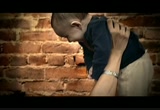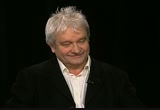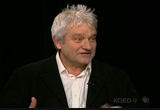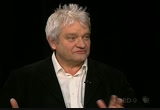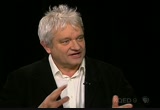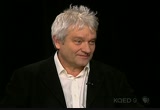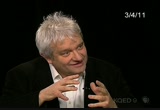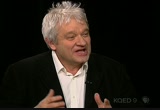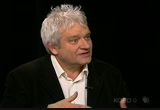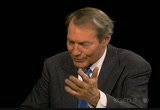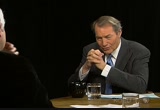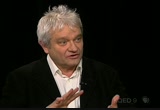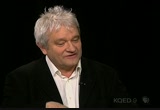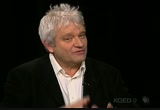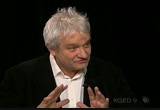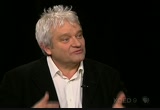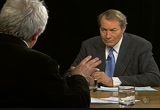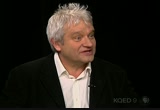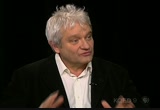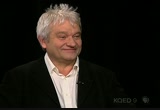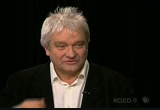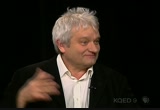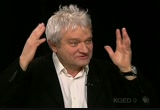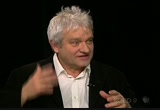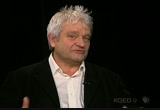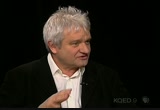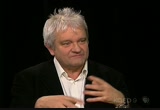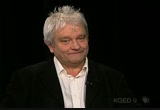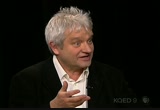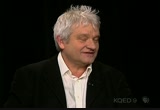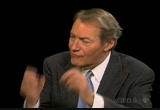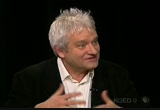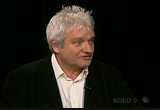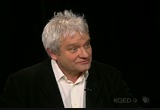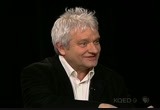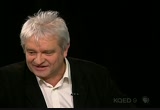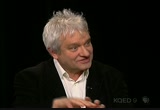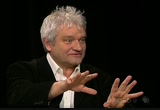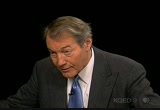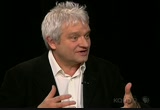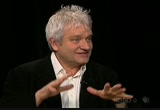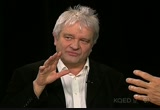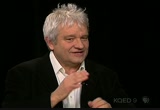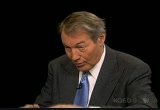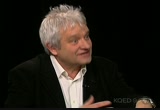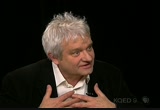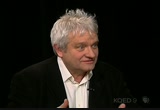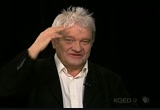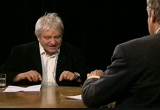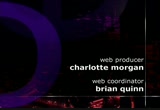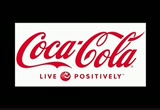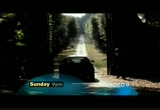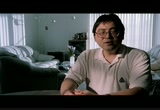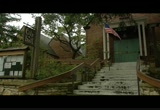tv Charlie Rose PBS July 30, 2011 12:00am-1:00am PDT
12:00 am
>> rosose: welcome to our program, tonight one of the world's foremost cancer researchers nobel laureate sir paul nurse. >> what i quite like being in charge of the institution is not exercising power. kuz when you're in an academic institution what you is have is let's take rockefeller university 70 brilliant minds. i shouldn't be exert pog we are over them. i should be liberating them. >> rose: sure. >> so they canctually generate all their creativity and do everything they want to do. so by being in charge and not exercising power, i actually empower my colleagues. >> rose: sir paul nurse for the hour, next. >> funding for charlie rose was provided by the foowing:
12:01 am
oot for. who beats the odds and comes out on top. but this isn't just a hollywood storyline. it's happening every day, all across america. every timea storefront op. or the midnight oil is burned. or when someone chases a dream, not just a llar. so if you wanna root for a real hero,wners. support small business. shop small. captioning sponsored by
12:02 am
rose communications from our studios in new york city, this is charlie rose. >> rose: sir paul nurse is here, he is a nobel prize winning biologist. he has been president of rockefeller university in new york city sie 2003. hes now leang that post on march 1st to lead an exciti new venture, it called the united kingdom center for research and innovation. among its completion in 25 it will be one of the largest bmedical facilities in the world. he also recently became president, get this, of the royal society london. what honor. this great. >>t is great and it's goods to be here again charlie, good to see you. >> rose: thank you. the reason you have divide divided-- decided to leave one job for another great job is? >> well, firstly, it's a bit bittersweet because rockefeller university, wonderful institution, i've
12:03 am
enjoyed my 7 to 8 years in new york and at rockefeller. >> rose: is that all. >> it is extraordinary. >> rose: i remember coming up to see you soon after y had taken the job. >> and it only seems a few days ago, doesn't it. great institution. great research organization. and so i'm feeling a little sad, quite frankly, at leaving new york and leaving all my colleagues here. i do think what i'm going going through is very, very interesting. funny, strange name. but it is the oldest scientific academy in the world. found in 1660 so it's been around for 350 years. >> your pred certificates-- predecessor has been on our program. got a lot of royal tough going on, don't we. anyway, it's a great institution. one of the leading academies some say theational academy, the leading academy and so have a lot of work to do there, influencing government and giving them
12:04 am
advice on science andhe applications of science. so that's one job. the stitute you mentioned, uk center for medica research and innovation which i canarely say myself wil have a real snappier name within a few months. >> what would be a snappier name. >> i'm not going to tell you that. i know what it's going to be. i have to keep it under wraps for a moment. >> will you have time to do research in london? >> absolutely. i mean i have managed to juggle and keep my own research, my own scholarly activity goi all my life despite nning institutions. and it will be possible to do that in london too. i've just won a grant to set up my lab there. i will begin that at the end of this year. and i will be spenng time just like i have at rockefeller running my own laboratory. >> rose: so what is the focus of your research and your concentration? >> i'm interested in cells. we're all made of cells as a basic unit of life. i'm interested in simple problems abo cells
12:05 am
i'm inrested in what controls their division and what controls their shape. i mean you couldn't have a simpler set ofuestions than that. >> rose: but y won the nobel prize for your early work. >> because of my early work in this area, yeah. but i'm-- . >> rose:he divisioand the decision-making of cells. >> exactly. i won it for, together with colleagues, of course, for working out the basic controls. but what i continue to work on there is how those controls actually bring about the processof cell vision. and how that actually works in a whole range of different cell types. so that's one issue that i'm really interested in. the shape one is newer. >> rose: why is that important. >> well, two things. 's interesting. evything that is biological has a characteristic shape. we have character stax shapes. trees have character stax shapes. that's how we recognize what is a living thing and what type of living thing it is. that applies to cells too. so it's a fundamental property of life of how you organize yourself in space.
12:06 am
again as with cell division you see which is the sort of basiof all reproduction, in terms of a cell, the shape is the simplest expression of biological shape. so we have a chance in simple systems of understanding it and that's why i've launched that program just to understand how a cell has a sense of its shape. how it determines its shape and controls it. >> do cancer cells start out as good cells and then they become bad? >> this is relevant actually the cell shape business, you asked the question about cancer. and 's relevant to that. let me explain why. cancer cells in a sense do start by being good. they behave. >> they behave. but then the have 25,000 genes or human clells do. and a number of them maybe 500 areell vant to cancer. when these get damaged as they do over theifete 6 an individual, if you damage enough andn the right
12:07 am
sorts of ws, those cancer relevant genes, then the cell s begin to misbehave and they misbehave in several ways. one is that thestart to grow and they shouldn't. the other is that ty start to divide and they shouldn't. which is one of the problems i was interested in. and another one when these cells actually start to escape from the original tissue where they form and start spreading through the body which is really one of the difficult metastasis on of the difficult problems with cancer, they have to change their shape. and so this where it becomes relevant to medicine. my basic interest is in how cells determine their shape, the basic biological property also relevant however to cancer. >> rose: why do they have to change their shape as they dide. >> because if you are's packed together in a tissue you know, you'reconstrained like this, you can't escape. u're stuck here. but if you can wriggle out then you can actually spread from that tissue to somewhere else. to do that you've got to undergo a transformation that allows you to spread.
12:08 am
and part of that involves a change in cell shape. >> back to you. you always d up running institutions. >> yes. >> what is it? what is your-- why is that? >> you know, charlie, i thought about that because i'm not even quite certain that i like running institutions. some of my friends may they're my enemies, actually when i think about it, they sathat i end up running institutions because can't bear anybody else-- reasons i read that too in the guard than. >> there may be some truth in that. i seem to end up doing it but perhaps partly because i'm going to be idealistic. i'll tell you why i convince myself i do it. i get driven to do my research by curiosity. i feel that if i'm going to enjoy my research so much, just satisfying my cursity, i have to pay something
12:09 am
back. i'm quite good at organizing things. i'm quite good at running things. it's my payback. so half my time i do my own research and i'm happy to do whatever i'm interested in. oth half i pay back by helping other people, running institutions, recruiting. >> it gives you power to have an impact beyond your own research. >> no, that isn't quite what i'm saying. what i'm saying is i don't feel so guilty because i feel guilty just-if i just did my own research i would feel a bit guilty about it but if i'm paying back to the community, the scientific community with the other half of my job, i don't feel so guilty about just playing in the lab. >> rose: the reason you ascend to the top of an initution is because it gives you the ability, you don't like the word power, ability to, impact others and therefore therefore payback. without the leadership of an institution -- >> you can't do th. >> rose: you can't pay back. >> that's absolutely true. and interestingly, what i quite like being in charge of the institution is not
12:10 am
exercising power. because when you're in an academic institution, what you have is let's take rockefeller university. 70 brilliant minds. i shouldn't be exerting power over them. i should be liberating them, so they can actually generate all their creativity and do everything they want to do. so by being in charge and not exercising power, i actually empower my colleagues. >> okay. but the empowerment of something is power too. i mean you use power, responbility to empower someone to do that. not power over them but you are giving them power. >> i'm hopefully liberating them and giving them power that is the bit i like. >> you have to have skill because people want to you run things. >> thedo. d what you've got to do. >> if you want t help them it does not necessarily make you good. a lot of people would ke to pay bac >> no. and you've got to be subtle about it. because i mean ultimately you're in charge. you have to make the
12:11 am
decisions. but ultimately i see my roll particularly with younger researcher meant to say junior researchers, otherwise the lawyers will talk to me. but junior researchers ultimately i see my roll to identify rlly good junior researchers, get them in. give them everything we can, that we can afford to give and let them get on with it. that does give me a lot of satisfaction, i have to say. >> but you're not acknowledging skills. you have to have the ability to listen. the ability to understand organization, the ability to motivate. you must have something that you picked up along the w. >> some core competent. >> something machiavellian. >> no. i'm putting more emphasis on it than it deserves. but it does strike everybody that kws you that you e asked to lead a lot of important things. the royal society, doesn't get any better than that, this whole new institution,
12:12 am
paul nurse is our guy. >> well, let me try and answer that in some sort of way. >> i sometimes feel i operate a little bit like the u.n., the united nations. sometimes i'm faced ith difficult problems. people are not getting on or devitt of persuading the government to give money or do this, that or the other and what i do try to do is engage individuals and try and find a wayhrough. so i really do focus on that. i'm not confrontational. i am very determined. but i look for a way which allows everybody to feel that they've got a piece of the action and can claim some victory. so i guess that might be a skill that i do have. >> there you go. >> let me move to stem cells. where are we today? >> right. let's-- first of all, what are stem cells, let's get that clear. stem cells are a particular type of cell in our body that actually in the all living organisms including plants have an equivalent of
12:13 am
stem cells. and what they are able to do is to keep proliferating, dividing, that is the process we were talking about before. and then the pro genie of that can turn into different cell types, into different tissues, into the different parts of different organs. so what you have with the stem cell is the ability for example to generate new nervous tissue, new parts of the brain, to regenerate different parts of the muscle and so on. and what we found out in the last ten years or so is the ways in which you can manipulate that. in other words, youtart with a stem cell that you treat with different chemicals or affect different genes, you can turn them into these different cell types. and we're on the brink of being able to use that for medical application. we now understand a lot better than we did even when i first came to this country, i have to say, seven or eight years ago. and we're now on t brink of being able to use that for medical treatment eatment. >> are embryonic stem cells
12:14 am
still the st source? >> embryonic stem cells are still the ones that are-have the greatest ability turn into different cell types. but we can now do quite a lot with cls which are being induced to be able to behave in the way that i just described. they're not quite as good as embryonic stem cells but they're getting very close to them. >> how did you manipulate a certain stem cell to become brain tissue or heart tissue? >> you know, it's not as difficult as it seems. it seems extraordinary because there are different chemicals you can add which different grth factors and the like there are different ways you can manipulate specific genes and that sort of forces a cell either to go in this direction or this directio and gradually they will become a heart cell or a muscle cell or a brain cell. >> and how far are we from beinableo create new hearts and new lungs and new -- >> i don't think that is
12:15 am
tomorrow. but what we do he is the ability to make ssues, which say a heart tissue, and gradually how i see that going that we may be able to makerimive organs in culture. by giving them a sort of 401(k) work upon whichto grow and that's already happening too, so that we can generate prim live organs. i think that's not so far away. but we're not quite there yet. but what we are, what we are close to being able to do is if you have a damaged spinal cord or other nervous tissue, of introducing cells that could turn into nerve cells and give you repair. so we're in the quite as far as you said but we're gradually getting there. >> you said we're on the brink. >> yes. >> so what do we need to get from being on the brink to being into the land o of-- discovery. >> well, as with all biomedical research i never
12:16 am
use the word breakthrough. i always use the word brick in the wall. i always think what we're constructing is a wall and each of these advances is another brick. and what i would say in this area, the potential for therapy we have a small wall and we're gradually moving to a big wall. and we'l graduly see one brick after another. it's hard work. it's partly imagination, a lot of it is perspation. i mean aot of it is just real grind in the laboratory. it needs money it needs resource. it needs focus d i ink there's many really good people including some at my own institution rockefeller university who are doing excellent work in this area. >> where are we in terms of are reaping t benefits of the map of the human again ly. >> switch to the genome. >> yes. what i can say about that. the first thing is some people have been a little disappointed because they felt you know we got the genome that was nearly the end of the story.
12:17 am
>> dow understand their disappointment. >> i understand this because in fact we should have made it clear as scientists is actually the beginning of the story. i have a metaphor for this. if you were writing a play, the sequence of the genome is like having the list of characters at the beginning of the play. and the job, you can't write the play without the list of characters, that's essential. but actually there's a lot of work that has to go on that depends on that human genome sequence but which isn't simply a consequence of that genome sequence. so it's a prerequisite, not the end of the story. that's the first thing to make clear. what are we doing, first of all there are some really cool things that have been found out. neanderthal man. we have now sequenced, not me, other scientists have sequced neanderthal man in the last year or two. this allows us to-- . >> rose: and found? >> and found-- first of all man beings and neanderthals this isn't my area, i think they diverged about 5,000 years ago,
12:18 am
something of that sort. andhey are close relative but a relative that doesn't have or was not thought to have human characteristics like culture or art or symbolism or even language. now we're not sure about that. but that's what we think based on you know artifacts. soow you can compare neanderthal which is extremely similar to homosap yens to ourselves and say what is the difference between these genetically. and this hasn't yet been properly or fully analyzed but there are a few genetic differences. and the question is are these important for what makes us human as against neanderthal. >> and what are those differences? >> well, some of them, people have speculated to do perhaps with speech, for example, which is one characteristic. but we don't fully understand it. but you have-- we ve to marvel, charlie. 20 years ago it would have been incomprehensible to me that we could produce the sequence of neanderthal.
12:19 am
i mean it'sompletely extraordinary. now that's justaside. you asked-- so that is one thing. secondly we now, the cost of dna sequencing is really reduced we can now sequenc sequence-- when seek the organizism i work on, i set up-- it took us four years, five years to do it. we could now do it in about a minute on one of these machines. just, it just-- the organizism you work on. >> we could sequence the whole thing in less than a minute. whereas maybe even seconds. whereas only 10 years ago it took me half a decade. now that rawequencing power and the ability to analyze it, a number of centers around the world means, for example, that there is a major project which is called the thousand genome project to sequence a thousand human beings, to get a sense of the whole variety of genetic variation. >> i would have thought that
12:20 am
would have been done five years ago. >> well, only-- think of when we actually -- >> in 2001 we had the first breakthrough. >> the first draft but that to be honest was a bit crude. needed another year or two to geto it. so 7 or 8 years since we've had one sequence. now we talk about a thousand. okay. d that one took i don't know ten years or something like that. we are already, and when i mean we i mean as the scientific community, we already have rough draft of thousand genomes which now means we can describe the majority of genetic variation in population. >> the larr the sample the more you can learn and compare. >> you canake different populations. that gives you the basis for being able to lookat associations of certain genetic changes together with certain diseases. th is sort of called association study. >> so they came to you and said how would you like to have your genome sequenced.
12:21 am
>> yes. >> you would say. >> i would be very interested in having my genome sequencbecause -- >> i would think that would be aomatic for you. >> yeah, i am really interested in it. i would rather kw and not know. some people worry about it. and i forget whether he with talked about it. but i discovered actually since i've been in the united states that my parents were not my parents. >> extraordinary story. >> rather interesting story. i was brought up meyer grandparents. >> lete tell the story. you applied for your visiona. >> a plied for a green card. >> and in doing that, you had to get some records. >> well, i was rejected by homeland security. and i thought well, you know, you know i have got a nobel prize. i have been knighted. i am president of rockefeller university what on earth. why is homeland security rejecting my application. and what it was was some bureaucrat did not like the fact that the birth certificati had did not name my parents. it what a -called sho
12:22 am
birth certifice. and that meant that -- it's a legal dumen and i never, ever thought about it before. and th meant that they didn't like it because the names weren't there. so i had to write away, get a full birth certifica. i cod have done it any time for 50 years before. and when it came back, and i looked at it, out of the envelope, actually surrounded by several people in my lab and my family, and they realized there was something not quite right because they were all looking at me. what iaw there was that my mother w actually m sister. extraordinary. >> because your mother had given birth to you. >> when she was 18. >> and she got pregnant. >> she went away and had you and then brought you back. >> she got pregnant. she was sent away like a victorian novel. she was sent away to her aunt, a hundred miles away. she gave birth to me. my grandmother came up, and
12:23 am
to that distant city. pretended that she was my mother, sent her daughter back, at 18 and then came back a couple of months later with me pretending she was -- >> so you lived life thinking that your mother was your sister. >> i lived life thinking that my grandparents were my parents, that my uncle are my brothers and that my sister, my mother was my sister. so everydy changed position in my family. >> and it also this i did not know. i read this just today, that there were pictures. four pictures at your mother's bedside table. >> yes, that's true. and three of them were her real legitimate children. >> but you were there, four pictures included you. >> it did and i never kne that until after we-- after she had died. >> and how do you explain the fact that at no point did your grandparents say to you, here is the truth. >> well that's interesting. you know, my family, i was
12:24 am
the only person in my family who stayed at school after 15. so and i'm a geneticist, this is the ultimate irony. here is me a geneticist having my own genetic origin kept entirely secret. and i-- i, once we got a bit close, when i had my children, they were ten years of age and they had a project at school, family free project. and i said welcome and talk to your grandmother and grandfather about this, something interesting, you know, to do. actually dangerous giving projects to children at school if you ask mood me. anyway they got there and my 11-year-old daughter, 10-year-old daughter took off my mother grandmother and about five minutes ler she came out white into the room, okay. and i said what's the matter, mum. and she id wl sar, e na of daughter, just asked me about my
12:25 am
parents. that is my-- and i had never told you but i was il legitimate. and i do not kno whomy father was and i was brought up by my grandmother. actually the same thing that happened to me. and afr she said that she then said and it'true for ur father too, who was pie grandfatr. if you put all of this together, i can see are you getting confused with my family free,-- tree, the only thing to take away from iti barely have a male ancestor. il legitimacy seems to be running totally in the family. you could ask why i do talk about it, actually. i thought a lot about that. i felt that my, this all happened because my mother felt the shame and the family felt the shame and it is in respect of her that i talk about it publicly. this wouldn't happen today. it happened in the '50s but it wouldn't happen today. >> but what does it mean to you beyond to know that, who your mother is. because you are-
12:26 am
>> well, it -- >> a scientist interested in biologist. >> i'm a scientist, a geneticist and i have no idea who my father , no idea at all. and to go back to how we got into this. if i had a sequence, of course, a dna sequence it would help in tnking, if nothing else, about the origin, ethnic origins of my father. >> with those two things together, the renowned nobel laureate you are, knowing everybod and every scientis, and this very interesting thing that happened to you, this discovery you made, it wod seem to me to be, you would demand to have that kind of sequencing done. >> well, i -- >> it is not beyond the reach of you to do it. >> it is absolutely not. and of course if it was a hollywood film i would sequence it myself, of course. and i have thght of doing a little bit of-- i have thought about doing to the a complete sequence but a little bit. you know, i haven't done it
12:27 am
i think because i'm just too busy. it's quite a full end project. if somebody else was interested in me as sort of a project i would be happy to collaborate but partly because i just haven't had the time to sort of sort it out. >> and so why can't you find out who your father was? >> well, it was not on the birth certificate. >> i know that. therwas no record, nobody ever said anything about it. >> there was no record. a few rumors. i did find out somebody who my cousin or second cousin i get confused about my own relatives now, who was 11 years of age in the house that i was born. and she said that there was a rumor it might have been an american servicemen, for example. but we don't really know. and i have no real way of finding out. except that, you know, this interesting. in certain populations having a sequence of the y chromosome, you have a probability of about one in four, onen five of predicting the surname.
12:28 am
because of everything is inherited through the y chromosome throughhe male side. so i could get some sequence if i was lucky i might get someames that would crop up there. coy en dignto some recordand se, what american servicemen might have been in london at the time, for example. or my real mother was very interested in jazz. so maybe somebody she met at a jazz club. i don't know. i think it would be possible to make -- >> befe we close this chapter, where are you now though in terms of this. you have fully talked about this for all the reasons you said. >> yes. >> do you think about it? do you want to take it to another step when you have time or -- >> well, first thing i have to say is when i first told my internist, my general practitioner here he looked at me, this is in new york and he said i hope you're under therapy, he said. and i had todisappointim that i wasn't unr erapy. but anyway,. >> that drives me crazy to hear somebody say something like that.
12:29 am
>> he was being supportive. >> as if someone you couldn't handle this without therapy? >> well, some people maybe it would be difficult. i've not found it difficult. i s brought up by loving parents it wasn't a problem. i'm very curious about it one day i wouldn't mind doing something if it doesn't happen before by somebody else. >> and how do your grandchildren-- i mean your chilen. >> yes, you know, i, and my siblings i have now acquired my nieces and nephews as my siblings. i thought for a day or two if shod let themknow and i thought i will-- everybody is perfectly at ease with it. it's just a shame my mother died before i found this out. otherwise we could have had a conversation. that would have been a wonderful conversation. >> i would like to have had a conversation. >> is that the most exciting frontier today? >> it's a very exciting frontier. but again we have to really
12:30 am
accept neurobiology and understanding how brains work is very complicated. ve complicated. we've had real advances in recent years particularly with imaging of the brain. and what's good about that is people can sort of immediately get some sense of it. you know, you speak one thing, you're thinking one thing and various things light up in the brain. so it is immediately visually appealing and you get some sense of it. but just because it's sort of easy to see that, it shouldn't be misunderstood how difficult it is to know how we think. how difficult it is to know how we perceive. so these are really big problems. and i am really pleased to sethat we're tackling them but it's going to be a long haul i think before we understand how brains work. >> i often ask this of eminen scientists which i think i may have asked you before but what is the question you would most like to see answered? >> that is an interesting question that you haven't asked me before. d i'm feeling aittle insecure in thinking about it. i think about what is the nature of life.
12:31 am
and i think about what it is that makes things living. that's not as complicated as brains, actually. and we go back to the game which is the simplest unit of life which exhibits the properties of life. and i'm interested in understanding what it is that gives you life. and i think that the way i'm sort of think about it and many others, of course s that life is an information management machine. it is managing all this information and that's the best way we c think about what life is in defining. you've got a cell. it's got a sense of the environmt. it's managing infmation by taking in what's happening in the environment, by interacting different components within that cell. and it's like a gigantic information management machine. understand that and wel get a sense of what life is d i don'tsay that is the most difficult problem to study but i do think it's a
12:32 am
problem that you could study. >> does this have anything do with somethin called th uni of biology? >> sometimes people talk about that. the unity of biology. unity of physics is where it usually comes from. uny of biology is trying to fd an explanation that would make sense of biology. >> a theory of everything. >> i would go for management of information, how you manage information. >> would be the theory of everything in biology. >> yes, correct. that's where i would go. >> i mean where we in that? >> we are molecular biology, for example, has been around 50 years. i always emphasize that those who invented molecular biology, all these great characters, they focus on how information was managed. dna, the structure of dna, beautiful structure. but actually what's really beautiful about it is when you recognize it's actually a digital memory device. that's what it actually is.
12:33 am
you know the memory of all those knew klee tieds, in a particular order conveys information. it stores informatio and that's how you should view it. and that's what is really beautiful. what i suggest is we need to translate that type of thinking into everything to do with how life works. >> yeah. i think einstein was interested in a theory of everything. and i think stephen hawkings is interested in a theory of everything. >> they're interested in how you can combine quantum mechanics which deals with e very sma which incideally is what my daughter worked on. >> is she working on the hydrogen collider. >> in geneva. >> and how you combine the thought there and how that works quantum mechanics togeth with gravity, and is thereome wayof understanding that. and ere is a theory i'm now well out of my depth so i may even say something stupid but theories which have taken string theories, called the n theory that are trying to put this together and stephen hawkings is in the middle of this. >> isn't she, aren't they in
12:34 am
cern switzerland trying to figure out, take life to the time of the great. >> the big bang. >> they want to take it back to that. >> it's-- enough energy, you see what they do, they've got these big colliders, about 20 kilometer. >> 70 miles of track. >> and i've been down there, it's extraordinary. and they collide these things. >> protons and they produce so much energy that they get close, closer to the conditions that existed in the -- >> looking for what? >> the main objective and they have several objective. the main objective is to look for a particle called the higs boson particle. and higgs is a person, actually, frritain. higgs proposed together with a couple of others, actually, that the mass of matter was invested in a higgs boson particle. and it been very difficult to decid and cern has been designed
12:35 am
to put enough energy in these collisions to generate one of these particles. >> l me go back to biolog is there any kind of thing like that going on in biology. >> well, it is information stuff. that's my guess. not everybody would agree. if you had eric here, eric, you have had a lot. we probably talk more about the brain. that is still a bit too complicated but i would go for the interactions that you see with information. >> the management of information. >> yeah, that's where i would go, yeah. >> and the focus is at the cellular level? >> i would because it's the simplist entity that exists the characteristics of life. and if you are's a scientist and want to solve mething, start at simple. start at simple so that where i would go. i would start with the cell. >> science is important because -- >> science is important because it's the most reliable way of gaining knowledge about the world and ourselves. there's something about science and the way we do it. it's to do with respect for
12:36 am
observation and experiment so y don't cherry pick data. half the problem with all the climate changis because diffent protagonists just collect, cherry pick certain bits of data. they treat it like a sort of debating argument rather than a scientific one. science respects all the da like on this table and tries to make sense of all of it. that's one thing. secondly sciences very skeptical when it's done well. you always challenge your own theories. your own worst enemy for your own theory. so what this means is that when you construct a theory or an idea that explains how things work you challenge it. you attack it. you never let it alone. that means that over the years, a theory or an idea get better and better because it's been challenged for so long. and that's why sometimes we think science isery secure like newton's laws of motion. and sometimes we n't think it's secure at all because right at an early point of the study and we've not done
12:37 am
it. the constant attack makes it better. and the third point which again is something that not everybody understands is there is a community of scientists who are challenging these ideas, challenging the data and when they come to a consens abt it you've got many, many minds who have been convinced that something is happening. and that isn't trivial. it's part of the socioly of the process that tually makes science secure. so science is important because it is very reliable generation of knowledge and therefore understanding. >> has the internet been a double-edged sword. >> the internet is a double-edged sword. it allows people to communicate. >> say anything they want. >> they can say anything they want. and what it means is, and sometimes i've argued that it's no longer peer review that's so important but point of view. the internet allows anybody to say anything. and even if they areotally unreliable. and that distorts science, actually.
12:38 am
because they're not behaving in a way, aga the climate change debate which i looked at a little bit in recent months. if you read all the blogs and so on people are just rude about each other. they use it as a debating trick. >> didn't they take on you at some point or some capacity. >> no, no, i was interested and did a program on the bbc on trust in science. i only use climate change as an example of how trust can be undermined. if anybody can say anything and it's treated with equa weight of people who really know what they're talking about. >> somebody once said you're entity elevatored to your opinion but you're not entied to the facts. >> yes, exactly right and the facts, what i am thinng about all these big issues, actually, that we're going to face, is that you have to tre the science objectively. you have separate it from the politics. it's no good having politics and ideology influenci scientific argument. >> but did you suggest in the piece that you did on televion that global warming has been damaged by -- >> by exactly that. >> so people believe it less
12:39 am
now because there was a blip in the use of evidence. >> it was so exaggerated it wasn't true. but what has happened her is verery interesting. you see people have are very worried about the impact if there is global warming might have if we respond to that, on economic growth. and on the economy. quite rigly so because it will have a big impt. but they're so worri about it i think what they are doing is they are trying to show that the science doesn't actually illustrate that. so they don't have to take on the problem. and that's because they don't like that sort of interference in the economy. so they're political views are influencing the science. >> but you know what is fascinate being this too is the people you would be surprised by who you have admired for other reasons, you know, have bought into the idea of challenging some of the assumptions about global warming. i mentned the late michael citeon is one. a novelist, an m.d. from harvard, buy guy.
12:40 am
freeman dyson. >> we had both, we have michael give a talk at rockefeller. i asked him to give one before he died. >> and frean dys. >> also, phycist who came here to talk about it. >> and this is, you see, i'm all in favor of skepticism and gument, okay, i think it's good toave range of views. what i don't like so much is when very small arguments are hugely exaggerated as if they are very, very important. and then when you, you know f there is a temrature change here that isust countering what one expect when all of nasa's measurements say something else. and then you read blogs and they just focus on ts an ignore everything else. that's not good science. >> you going to london to do this, david cameron, i understand, in a moment of which he's getting significant applause from certain cycles because of austerity budgeting that he and george osborn have called on britain to make. >> yes. >> to live with.
12:41 am
>> yes. >> is full fuing science. >> yeah,. >> what is it about david cameron that made him a believer. okay, so he had a science minister david willits who was very pro this. but also a number of us including myself, actually, had a lot of discussion at different levels of government including with david cameron and persuaded him that science and knowledge is the basisof innovation and innovation is the basis of economic growth. >> and that, if you switch off the knowledge machine you ll swih of ultimate growth. and they bought into that as they should have done. >> that's part of what the president emphasized in his state of the union speech. >> he did. i think -- >> what's the difrence in cameron and obama? >> wel, i think i think we-- i think the problem here is you have toave a long-term view. so the oma smulation money though very welcome
12:42 am
was for a two year period. and it's not like building roads and keeping people in the employment. science is actually best seens a long-term invement. and rlly. >> but the key is investment rather than expenditure. >> correct. >> it is an investment in innovation n growth, it's an investment in the future. >> it's not simple but it's like this. you have basic science and discovery science i prefer to call it actually. discovery science that gives you the understanding of the world and ourselves. we then have translation of that knowledge into the potential for application. and then we have the application, i mean in medicine it would be clinical trial. and what you need to do is invest across the whole spectrum. sometimes people say oh we know enough we should just invest in translation or some say we should just invest in direct application but then you run out of ideas very, very quickly. you have to invest across the whole spectrum. that's what is really required. and cameron i think recognized that.
12:43 am
>> there's a big thing, big subject in america today called america's decline or america's competitiveness, that's wt thepresident spoke to in his state of the union. and all kinds of people are debating this subject now. it has to do with the rise of china and india and the economic growth of those emerging nations. it has to do with the fact that technology s no respect for boundaries which we are discovering in the middle east right now, right. >> absolutely. >> where do you come down on that in terms of america because you're leaving america. >> yh. america h ha great natural resources, huge amount of land and that's been extremely important in its growth. but it also has respeed science and innovation. and we see great growth areas. i mean california and in the boston area in particularly and i think america recognizeds the importance of human capital. i think that's intellectual
12:44 am
capital and the generation of ideas. but it needs more nurturing. i mean science education in the u.s. is not up to scratch. >> what does that mean not up to scratch. >> it'just not generating enough educated individuals either those that would actually go into science which is what we're mainly talking about here, but also producing an educated population who can actually coribute making decisions in democracy that are increasingly going to be based on science. i mean it's going to be no good if we he innovation if we find that individuals are so uncomfortable with certain things. we can talk about stem cell arguments, for example, that it's not used. and we need to be able to educate the whole population that they can recognize what science is and when are you cong to a scientific decision rather than a point of view. that's a little bit of a distraction. >> here an an interesting question then, is china better at it tn we are
12:45 am
because on the other hand, yoknowthey have a paranoia. >> i'll give you. >> about the free flow of information. >> exactly right. i will tell you what i think about. china very large and it's investing in science in the same way. but in my view unless you have a free societyhat encourages free information transfer, free integration and the mixture of cultures, you will never get truly innovated sciencement so i think that what may hold china back is not having enough freedom to allow science to thrive. if you look back in sort of history you see the times when different counies and areas were actually most productive. it is usually when there is a maelstrom of cultures mixing things up where knowledge is just freely availablin exactly the way you're saying am now america's done that at differt times in its history. and i think it has to do it again. >> it has to recapture that. >> it has to recapture that. it maybe lose-- it can't be complacent so it has to encourage the best from the world to come and it has to
12:46 am
allow-- anllow theto stay when they're good and generate that intellectual excitement. >> when you look at the unit states today, and wh you travel arounthe world what are they saying about us? >> i think-- some of the same things you just said. we may have taken our eye off the ball in terms of the importance of science, we may have taken our eye bauf the ball in terms of emphasizing scientific education. >> i think eye off the ball is traps perhaps too strong but i think that there's no doubt that other countries doetter with science education. however the u.s. does have a real edge. one is there is a certain optimism that knowledge will generate innovation and improvement. and optimism is really important. and secondly, there is enough capital and a wish to take risk. >> capital in
12:47 am
terms-of-financial capital. >> financial capital i'm talking about, not just intellectual capital because you need intellectual capital but you then need the financial capital to actually drive tt. and u have to have people who are prepared to take a risk because you can't say if it works. and who have a long-term view. there's a bit of a problem with the stock market. if you just look for short-term profit, that's a bit of an iss. because if you do that, then there will be i think a natural focus. gosh, are you making me talk about economics now. dow foe i'm a yeast buy om gist, don't you. >> i never heard you say that, i'm a yeast biologist. >> well, i work on yeast, i'm a yeast biologist. i mean if you were trying to make money how would you most reliably make money. you can make money by mergers and acquisitions because you can -- >> something called transactions. >> okay. the second thing you can do is incremental innovation. you have a car, you make it a little bit more efficient
12:48 am
here, save money there. true innovation is just completely different. it's much chancier business. and what we have todo is to think not only in the u.s. but actually in the world how we can best drive that true innovation, how we can actually produce the conditions where we can make that work. >> here is the intereing thing about the united states and i don't want to go too far out on th. but think about all the things that most of the discoveries having to do with the internet, most of them happened here. not all of them but a t of them. facebook is a creation of -- >> true. >> did you like the fill number. >> i did. did you? >> yeah, i did, actually. >> but i would love to have a conversation right here at this table with mark zuckerberg as whether he liked the film or not. >> but i mean that kind of geniuswhat amazes me is when the president of russia comes to the united states, he goes to silicon valley. >> yes. >> he wants to create a silicon valley. >> everybody wants to create --
12:49 am
>> when you had zing too goes to the united states he first goes to seattle, washington and the silicon valley and standford befor he comes toashington d.c. there is an understanding of where america built its continuing success. >> and let's just think about that. because that's really important. we have powerful academic centers driven by curiosity to understand the world. interacting with those who are wanting to use the discoveries for human good and are prepared to invest in it. and that is, that's a potent brew. and america does it very well. and we have support those academic centers. we have to make sure there's engh capital and we have to be prepared to take long-term risks. >> one of the interesting questions of the future is i think a lot of people went into financial engeering of all kin, hed funds, and it made tons of money, more money than anybody ever imagined people making.
12:50 am
they got rich, rich, richer in a shorter period of time than anybody. and it happen not just in the u.s. but in china and a lot of other places, what are these people going to do with all tt money in terms of their own philanthropic thing. you now have gates and buffett, the giving pledge ich is simpl a nonenforceable butromise that you will give away, you know, a lot of the money that you are making. which is the passing it on into a positive -- >> and you know institutions like the one i have lead, will lead up for a few more days, rockefeller university has been built on phanthropy. it's been built starting wi the rockefellers, still with david rockefeller. and they have recognized that they are investing in the future. it's investment again. they're investing in ideas. some of which, all of which are going to enrich culture and understanding. and some of whi are going to be really valuabl and important for humankind. and some of which, which will make money. and they have invested in
12:51 am
the next generation by investing in that knoedge generating machine. >> if you had it to do over life has been very good to you, as you said the first of your family to do a number of things, would you do it differently? >> you know, i don't think i would. i have been extremely fortunate, you'reight. beuse one is i have indulged my curiosity all my life. sometimes i wonder why they pay me to do my job because they pay me to play in the laboratory. i love it, okay. and i-- whatever i did, i would want toindulge that curiosity of understanding the world. i think i-- maybe i didn't have to be a scieist. i could some other sort of discipline but i think i would just want to do that again. would i want to make lots of money? i don't think so. would i want to be a politician? i don't think so. >> how about a playwright. >> you know when i was at school, no, no, when i was
12:52 am
at school, i thought should i do science or should i do theatre. some people say i still do theatre, by the w. >> i know why. >> and i actually have a great empathy for thee at callity. i am-- and admiration for it. >> real admiration for it i'm a bit of a shakespeare buff and i think understanding how humans work, i get a different perspective by going to the theae. which complements what we do. >> which says something also equally important that in understanding the human condition, there is a desperate need for science, and there's also a desperate need for thosin the world of culture and art to help us see who we are in the other dinsion. >> it's essential. and sometimes although i'm --. >> examining behavior from a different place. >> competely. i couldn't agree more. becausi worry a bit about the humanity.
12:53 am
you ow, because i can always make the case for science. because you know people feel ultimately increases the economic growth and quality of life. but the humannities are there to improve the quality of lif we will be incomplete unless we can have both of those areas moving together. >> i close this conversation by saying first of all it's so great to you have back at the table. and i look forward to you continuing to visit here wherever you are whether-- whenever are you in the united states or whether we are in london or wherever we might be. but also with it the idea it seems to me that brings art and science together is that at this table we have had the best scientists in the world an are you among them. we've all had the best artists in the world. they both out lirzed the scientific process for creating what they do, whether you are in a laboratory or whether an artist is working, it is a scientific process for them and they will all tell you that. it's a series of decisions
12:54 am
about color. it's a series of trial and error. it's a series of being critical of yourself. painters will finish what they can and get up in the morning, the next morng and paint over it and do away with it because they're not happy. they've made a judgement about the results. but it's a series, it's a scientific process that is part of art. as well as it is a part of science. >> now i see an affinity. creativity depends onwo things. it depends on really precise logic but alsoeein a big picturof what's going on. you need to have both of those in both great t and great science. >> and in the end it's also driven by curiosity. >> always by curiosity. >> great to have you. >> pasure to be here ain. >> sir paul nurse, thank yo for ining us for this hour. see u next time. captioning sponsored by rose communications
12:56 am
167 Views
IN COLLECTIONS
KQED (PBS) Television Archive
Television Archive  Television Archive News Search Service
Television Archive News Search Service  The Chin Grimes TV News Archive
The Chin Grimes TV News Archive 
Uploaded by TV Archive on

 Live Music Archive
Live Music Archive Librivox Free Audio
Librivox Free Audio Metropolitan Museum
Metropolitan Museum Cleveland Museum of Art
Cleveland Museum of Art Internet Arcade
Internet Arcade Console Living Room
Console Living Room Books to Borrow
Books to Borrow Open Library
Open Library TV News
TV News Understanding 9/11
Understanding 9/11
